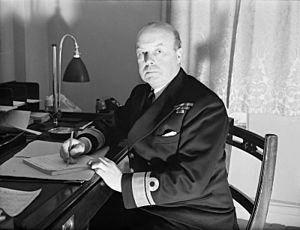Claud Barry facts for kids
Quick facts for kids
Sir Claud Barry
|
|
|---|---|

Barry at his desk in 1943
|
|
| Born | 17 July 1891 |
| Died | December 27, 1951 (aged 60) Beaulieu, Hampshire |
| Allegiance | |
| Service/ |
|
| Years of service | 1904–1951 |
| Rank | Admiral |
| Commands held | HMS C20 HMS C21 HMS D4 HMS R12 HMS K22 HMS K26 HMS Queen Elizabeth |
| Battles/wars | World War I World War II |
| Awards | Knight Commander of the Order of the British Empire Companion of the Order of the Bath Distinguished Service Order |
Sir Claud Barrington Barry (born July 17, 1891 – died December 27, 1951) was a very important officer in the Royal Navy. This is the United Kingdom's navy. He rose to the high rank of Admiral. He also held key positions like Naval Secretary.
Contents
Claud Barry started his journey in the Royal Navy in 1904. He studied at special naval schools. These included Cordwalles School, the Royal Naval College, Osborne, and the Royal Naval College, Dartmouth.
During World War I, he served in the Submarine Service. This meant he commanded submarines. Some of the submarines he led were HMS C20, HMS C21, HMS D6, and HMS R12.
Between the Wars and World War II
After World War I, Barry worked with the Royal Australian Navy. He then took command of more submarines. These included HMS K22 and HMS K26. In 1934, he became the Chief of Staff. This meant he was a main helper to the Admiral in charge of submarines.
He also played a role in World War II. He helped the Second Sea Lord, who is a very senior naval officer. Later, he became the Captain of the battleship HMS Queen Elizabeth. In 1942, he was promoted to Rear-Admiral, Submarines. This put him in charge of all submarines.
After World War II ended, Sir Claud Barry continued his important work. He became the Naval Secretary. This role involves managing the navy's administration. From 1946 to 1951, he was the Director of Dockyards. This meant he oversaw the places where naval ships are built and repaired.
 | Charles R. Drew |
 | Benjamin Banneker |
 | Jane C. Wright |
 | Roger Arliner Young |

